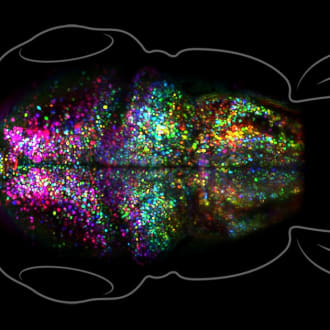The Best of Quanta Magazine
20+ most popular Quanta Magazine articles, as voted by our community.
New this Week
These are fresh off the press.
Insects and Other Animals Have Consciousness, Experts Declare
A group of prominent biologists and philosophers announced a new consensus: There’s “a realistic possibility” that insects, octopuses, crustaceans, fish and other overlooked animals experience…
Merging Fields, Mathematicians Go the Distance on Old Problem
Mathematicians have illuminated what sets of points can look like if the distances between them are all whole numbers.
Trending
These are currently making the rounds on Refind.
A Mathematician On Creativity, Art, Logic and Language
The recipient of the 2024 Crafoord Prize in Mathematics discusses math as art, math as language, and math as abstract thought.
Physicists Finally Find a Problem Only Quantum Computers Can Do
Researchers have shown that a problem about the energy of a quantum system is easy for quantum computers but hard for classical ones.
How Do Machines ‘Grok’ Data?
By apparently overtraining them, researchers have seen neural networks discover novel solutions to problems.
Elliptic Curve ‘Murmurations’ Found With AI Take Flight
Mathematicians are working to fully explain unusual behaviors uncovered using artificial intelligence.
Viruses Finally Reveal Their Complex Social Life
New research has uncovered a social world of viruses full of cheating, cooperation and other intrigues, suggesting that viruses make sense only as members of a community.
Quanta Magazine on Biology
Animals Can Count and Use Zero. How Far Does Their Number Sense Go?
Crows recently demonstrated an understanding of the concept of zero. It’s only the latest evidence of animals’ talents for numerical abstraction — which may still differ from our own grasp of numbers.
Why Are Plants Green? To Reduce the Noise in Photosynthesis.
Plants ignore the most energy-rich part of sunlight because stability matters more than efficiency, according to a new model of photosynthesis.
Quanta Magazine on Computers
Common Sense Comes to Computers
The problem of common-sense reasoning has plagued the field of artificial intelligence for over 50 years. Now a new approach, borrowing from two disparate lines of thinking, has made important…
Computers Evolve a New Path Toward Human Intelligence
By ignoring their goals, evolutionary algorithms have solved longstanding challenges in artificial intelligence.
Quanta Magazine on Computer Science
The Computer Scientist Who Boosts Privacy With Entropy
Harry Halpin wants our internet conversations to be more private. He’s helped create a new kind of network that might make it possible.
Perfecting the Art of Sensible Nonsense
In a watershed moment for cryptography, computer scientists have proposed a solution to a fundamental problem called “program obfuscation.”…
Quanta Magazine on Cryptography
Which Computational Universe Do We Live In?
Cryptographers want to know which of five possible worlds we inhabit, which will reveal whether truly secure cryptography is even possible.
Researchers Identify ‘Master Problem’ Underlying All Cryptography
The existence of secure cryptography depends on one of the oldest questions in computational complexity.
Quanta Magazine on Math
In Mathematics, It Often Takes a Good Map to Find Answers
Mathematicians try to figure out when problems can be solved using current knowledge — and when they have to chart a new path instead.
«“I think one of the reasons we were stonewalled was not because we didn’t have the right techniques, but because the problem wasn’t put in the right conceptual framework,” McMullen said. “The changed question suggested the changed techniques.”»
Computing Expert Says Programmers Need More Math
Leslie Lamport revolutionized how computers talk to each other. Now he’s working on how engineers talk to their machines.
Quanta Magazine on Physics
Computer Science Proof Lifts Limits on Quantum Entanglement
Three computer scientists have solved the NLTS conjecture, proving that systems of entangled particles can remain difficult to analyze even away from extremes.
Elliptic Curves Yield Their Secrets in a New Number System
Ana Caraiani and James Newton have extended an important result in number theory to the imaginary realm.
Quanta Magazine on Puzzles
How to Win at Wordle (Without Cheating)
Solve these puzzle questions to level up your Wordle game.
Puzzles on Weighing Truth With a Balance Scale
In recreational mathematics, the balance scale is an endless source of puzzles that require precise and elaborate logic and teach the fundamentals of generalization.
Quanta Magazine on Quantum Computing
Thirty Years Later, a Speed Boost for Quantum Factoring
Shor’s algorithm will enable future quantum computers to factor large numbers quickly, undermining many online security protocols. Now a researcher has shown how to do it even faster.
Physicists Create a Wormhole Using a Quantum Computer
The unprecedented experiment explores the possibility that space-time somehow emerges from quantum information, even as the work’s interpretation remains disputed.
Quanta Magazine on Science
How the Physics of Nothing Underlies Everything
The key to understanding the origin and fate of the universe may be a more complete understanding of the vacuum.
What Is the Nature of Consciousness?
Consciousness, our experience of being in the world, is one of the mind’s greatest mysteries, but as the neuroscientist Anil Seth explains to Steven Strogatz, research is making progress in…
Quanta Magazine on Space
How to Make the Universe Think for Us
Physicists are building neural networks out of vibrations, voltages and lasers, arguing that the future of computing lies in exploiting the universe’s complex physical behaviors.
What Drives Galaxies? The Milky Way’s Black Hole May Be the Key.
Supermassive black holes have come to the fore as engines of galactic evolution, but new observations of the Milky Way and its central hole don’t yet hang together.
Popular
These are some all-time favorites with Refind users.
A Good Memory or a Bad One? One Brain Molecule Decides.
When the brain encodes memories as positive or negative, one molecule determines which way they will go.
Where Do Space, Time and Gravity Come From?
Einstein’s description of curved space-time doesn’t easily mesh with a universe made up of quantum wavefunctions. Theoretical physicist Sean Carroll discusses the quest for quantum gravity with host Steven Strogatz.
How Big Is Infinity?
Of all the endless questions children and mathematicians have asked about infinity, one of the most fascinating has to do with its size.
Self-Taught AI Shows Similarities to How the Brain Works
Self-supervised learning allows a neural network to figure out for itself what matters. The process might be what makes our own brains so successful.
Scientists Watch a Memory Form in a Living Brain
While watching a fearful memory take shape in the brain of a living fish, neuroscientists see an unexpected level of rewiring occur in the synaptic connections.
«Neuroscientists generally agree that the brain forms memories by modifying its synapses — the tiny junctures where neurons meet. But most believe that it mainly does so by tweaking the strength of the connections, or how strongly one neuron stimulates the next, Fraser said.»
What is Refind?
Every day Refind picks the most relevant links from around the web for you. is one of more than 10k sources we monitor.
How does Refind curate?
It’s a mix of human and algorithmic curation, following a number of steps:
- We monitor 10k+ sources and 1k+ thought leaders on hundreds of topics—publications, blogs, news sites, newsletters, Substack, Medium, Twitter, etc.
- In addition, our users save links from around the web using our Save buttons and our extensions.
- Our algorithm processes 100k+ new links every day and uses external signals to find the most relevant ones, focusing on timeless pieces.
- Our community of active users gets the most relevant links every day, tailored to their interests. They provide feedback via implicit and explicit signals: open, read, listen, share, mark as read, read later, «More/less like this», etc.
- Our algorithm uses these internal signals to refine the selection.
- In addition, we have expert curators who manually curate niche topics.
The result: lists of the best and most useful articles on hundreds of topics.
How does Refind detect «timeless» pieces?
We focus on pieces with long shelf-lives—not news. We determine «timelessness» via a number of metrics, for example, the consumption pattern of links over time.
How many sources does Refind monitor?
We monitor 10k+ content sources on hundreds of topics—publications, blogs, news sites, newsletters, Substack, Medium, Twitter, etc.
Can I submit a link?
Indirectly, by using Refind and saving links from outside (e.g., via our extensions).
How can I report a problem?
When you’re logged-in, you can flag any link via the «More» (...) menu. You can also report problems via email to hello@refind.com
Who uses Refind?
450k+ smart people start their day with Refind. To learn something new. To get inspired. To move forward. Our apps have a 4.9/5 rating.
Is Refind free?
Yes, it’s free!
How can I sign up?
Head over to our homepage and sign up by email or with your Twitter or Google account.































